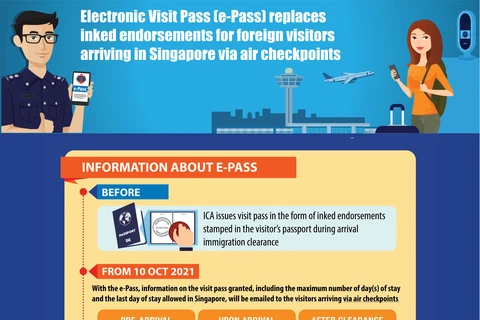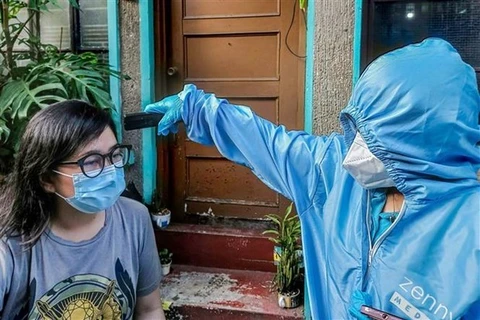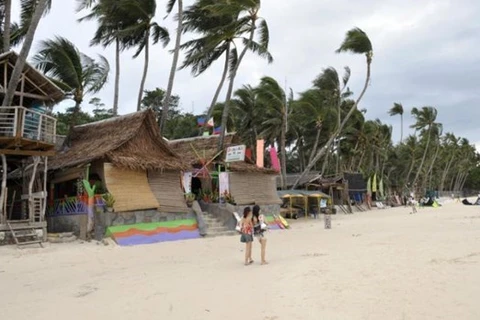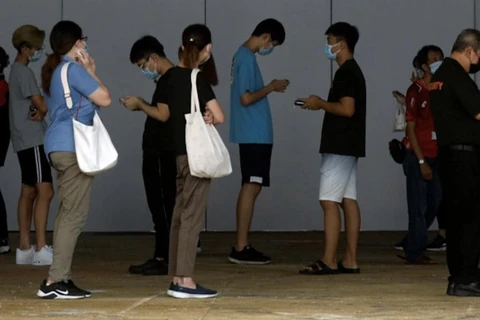Hanoi (VNA) – Philippine President Rodrigo Duterte has signed an order on easing entry regulations for foreign tourists to boost international tourism, increase foreign investments, and restore jobs in the tourism sector.
Under the order, signed on March 21, the Philippine leader asked the government to further relax the requirements on international travel, including providing quarantine exemption to vaccinated foreigners entering the country. He also ordered reducing domestic travel restrictions to boost local tourism.
Duterte stressed the need to align the government's economic recovery programmes and measures to bring the economy back to the growth path.
The measures include strengthening the health care capacity across the country, accelerating and expanding the vaccination programme, further reopening the economy and expanding public transport capacity, resuming face-to-face learning, and accelerating digital transformation.
COVID-19 pandemic, which broke out in 2020, has drastically affected the Philippine economy, contracting its gross domestic products by 9.6 percent in 2020, the first recession since the 1997-1998 Asian financial crisis. The economy grew by 5.6 percent in 2021.
So far, more than 65.2 million people, or 72.49 percent of the targetted population, have been fully vaccinated since the vaccine rollout in March last year.
Meanwhile, Singapore and Malaysia have agreed to reopen their border for vaccinated people to resume normal travel activities via all transport forms from April 1 without having to take COVID-19 tests.
The decision was announced in a a joint press release issued after the telephone talks between Singaporean PM Lee Hsien Loong and his Malaysian counterpart Sri Ismail Sabri Yaakob on March 24.
Accordingly, the two sides will allow vaccinated people and children under 12 years old to cross their border normally without having to take quarantine or COVID-19 tests before their departure or after arrival.
During the talks, the two sides recognised positive progress in COVID-19 vaccination and pandemic control in both countries, which prompts them to reopen the shared border.
Singapore and Malaysia enjoy deep, warm and multifaceted relations, as well as strong people-to-people ties. The announcement is a significant milestone in the transition towards living with COVID-19, said Prime Minister Lee Hsien Loong.
It reflects the strong collaboration both sides have enjoyed throughout the pandemic and will help both countries emerge stronger from this crisis, he said.
Malaysian Prime Minister Ismail Sabri Yaakob noted that the opening will coincide with Malaysia’s opening of its borders to international travellers on April 1.
This will certainly contribute to the recovery efforts with positive impacts on the economies and livelihood of the people of both countries, he added./.
Under the order, signed on March 21, the Philippine leader asked the government to further relax the requirements on international travel, including providing quarantine exemption to vaccinated foreigners entering the country. He also ordered reducing domestic travel restrictions to boost local tourism.
Duterte stressed the need to align the government's economic recovery programmes and measures to bring the economy back to the growth path.
The measures include strengthening the health care capacity across the country, accelerating and expanding the vaccination programme, further reopening the economy and expanding public transport capacity, resuming face-to-face learning, and accelerating digital transformation.
COVID-19 pandemic, which broke out in 2020, has drastically affected the Philippine economy, contracting its gross domestic products by 9.6 percent in 2020, the first recession since the 1997-1998 Asian financial crisis. The economy grew by 5.6 percent in 2021.
So far, more than 65.2 million people, or 72.49 percent of the targetted population, have been fully vaccinated since the vaccine rollout in March last year.
Meanwhile, Singapore and Malaysia have agreed to reopen their border for vaccinated people to resume normal travel activities via all transport forms from April 1 without having to take COVID-19 tests.
The decision was announced in a a joint press release issued after the telephone talks between Singaporean PM Lee Hsien Loong and his Malaysian counterpart Sri Ismail Sabri Yaakob on March 24.
Accordingly, the two sides will allow vaccinated people and children under 12 years old to cross their border normally without having to take quarantine or COVID-19 tests before their departure or after arrival.
During the talks, the two sides recognised positive progress in COVID-19 vaccination and pandemic control in both countries, which prompts them to reopen the shared border.
Singapore and Malaysia enjoy deep, warm and multifaceted relations, as well as strong people-to-people ties. The announcement is a significant milestone in the transition towards living with COVID-19, said Prime Minister Lee Hsien Loong.
It reflects the strong collaboration both sides have enjoyed throughout the pandemic and will help both countries emerge stronger from this crisis, he said.
Malaysian Prime Minister Ismail Sabri Yaakob noted that the opening will coincide with Malaysia’s opening of its borders to international travellers on April 1.
This will certainly contribute to the recovery efforts with positive impacts on the economies and livelihood of the people of both countries, he added./.
VNA























